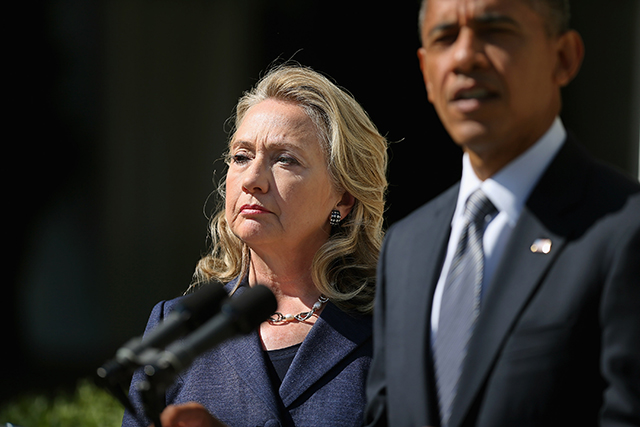House Comprehensive Benghazi Report Faults Lack of Planning and Military Resources
Helle Dale /
The House Armed Services Subcommittee on Oversight and Investigations this week released a comprehensive interim report on the military response—or lack thereof—to the Benghazi attack. As it was composed by the majority staff at the behest of subcommittee chairman Buck McKeon (R–CA) and other Republican members, it is probably fair to say that it pulls no punches.
>>> Check Out: Meet the Man in the Middle of Benghazi Talking Points Scandal
The bottom line: Though no U.S. official has been found to have given a “stand down” order to hamper the rescue of U.S. personnel in Benghazi, the inexcusable absence of State Department and Pentagon planning and assets to protect American diplomats in high-risk posts such as Libya led to the tragic loss of four lives and the deep frustration of those trying to save them.
To recap the report’s main findings:
- “White House officials failed to comprehend or ignored the dramatically deteriorating security situation in Libya and the growing threat to U.S. interests in the region.” For instance, President Obama was given a global security briefing on September 10—the day before the attack—but Libya was not even mentioned.
- “U.S. personnel in Benghazi were woefully vulnerable in September 2012 because a.) the administration did not direct a change in military force posture, b.) there was no intelligence of a specific ‘imminent’ threat in Libya, and c.) the Department of State, which has primary responsibility for diplomatic security, favored a reduction of Department of Defense security personnel in Libya before the attack.”
- “Defense Department officials believed nearly from the outset of violence in Benghazi that it was a terrorist attack rather than a protest gone awry.” President Obama immediately directed them to respond with all available assets (after which, inexplicably, he proceeded to mislead the American people about the cause of the attack, blaming an Internet video).
- “The U.S. military’s response to the Benghazi attack was severely degraded because of the location and readiness posture of U.S. forces, and because of lack of clarity about how the terrorist action was unfolding.” Secretary of Defense Leon Panetta does not even appear to have known that there was a CIA annex in Benghazi, the target of two waves of terrorist assault on that fateful night.
- “There was no ‘stand down’ order issued to U.S. military personnel in Tripoli, who sought to join the fight in Benghazi. However, because official reviews after the attack were not sufficiently comprehensive, there was confusion about the roles and responsibilities of these individuals.” By resisting congressional investigations from day one, the Obama Administration itself exacerbated the confusion over the exact sequence of events.
- “The Department of Defense is working to correct many weaknesses revealed by the Benghazi attack, but the global security situation is still deteriorating and military resources continue to decline.” This is the crux of the matter: The Benghazi debacle is a reflection of Obama’s failed stewardship of U.S. defense capabilities, and it is critically important that this decline in military resources be reversed.
The military failure in Benghazi has never been fully explained, and the report comes as close as anyone ever has been to explain why no U.S. forces outside Libya were able to reach Benghazi in time. It is a tragic and sober tale of failure at the highest levels of the U.S. government.

